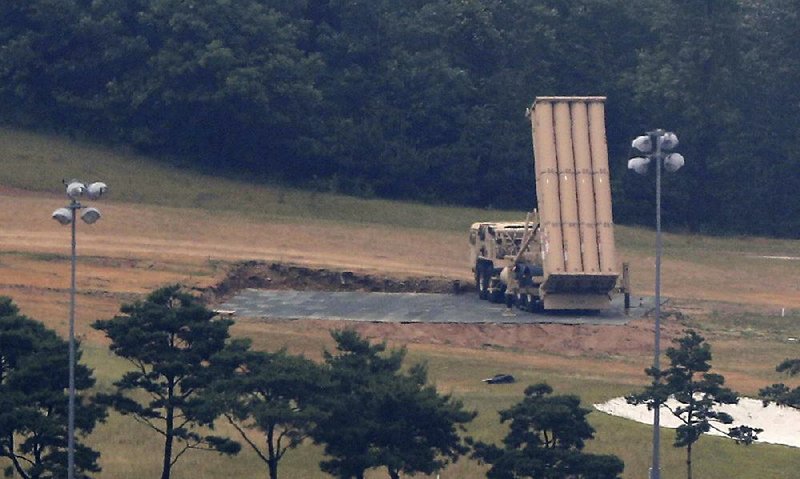SEOUL, South Korea -- North Korea fired several suspected short-range surface-to-ship cruise missiles off its east coast early this today, South Korea's military said.
The tests came after South Korea's newly elected president, Moon Jae-in, suspended the installation of a U.S. missile-defense system, an apparent concession to China and a significant break with the United States on policy toward North Korea.
A senior official from the presidential Blue House in Seoul said Wednesday that the two launchers of the Terminal High Altitude Area Defense system that had been installed could remain but that four launchers yet to be placed would not be set up until the administration completed an environmental assessment.
Of the North's missile test, South Korea's Joint Chiefs of Staff said in a statement that the launch came from the North Korean eastern coastal town of Wonsan, and that the projectiles likely flew about 125 miles with an apogee of more than 1 mile.
The North's projectiles were fired into waters between South Korea and Japan where U.S. aircraft carriers USS Carl Vinson and USS Ronald Reagan participated in joint exercises with the South Korean navy that ended earlier this week. Roh Jae-cheon, spokesman for Seoul's Joint Chiefs of Staff, said North Korea with the latest launch intended to show off its widening array of missiles and also its "precision strike capabilities" on ships in response to the joint drills.
Last week, North Korea fired a short-range ballistic missile that also landed in waters between South Korea and Japan. Japanese Foreign Minister Fumio Kishida said after this morning's launch that Tokyo has not detected any "flying objects" that headed toward Japan or landed inside the country's maritime economic zone.
The launches this morning from Wonsan were North Korea's fourth missile test in as many weeks as the country continues to speed up its development of nuclear weapons and missiles.
In South Korea, the U.S. missile-defense system has been contentious and has drawn sharp criticism from China, which views the system's radar as a threat. China has taken retaliatory economic measures against Seoul, including curtailing the flow of Chinese tourists and punishing South Korean companies in China.
During his campaign, Moon, who won the presidency last month, complained that the United States and the previous South Korean administration rushed to deploy the missile-defense system before the election to present him with a fait accompli. His decision to suspend the installation could strain relations with the White House, which has taken a hard line in confronting North Korea and its nuclear weapons program. It also could raise concerns about United States efforts to present a tough, unified position with Japan and South Korea against the North.
Moon, who has said he wants to try to resolve the North's nuclear crisis through dialogue, also has suggested that South Korea must "learn to say no" to Washington. He has signaled a softening stance toward North Korea by encouraging aid groups to visit the country, although the North has rejected those offers since Seoul supported new United Nations sanctions.
The defense system officially went into operation in April on an abandoned golf course in Seongju, 135 miles southeast of Seoul, when two of six launchers were installed. U.S. military officials have said the system is already "operational and has the ability to intercept North Korean missiles."
Information for this article was contributed by Hyung-jin Kim, Kim Tong-hyung and Mari Yamaguchi of The Associated Press and by Motoko Rich, Su-hyun Lee, Jane Perlez and Helene Cooper of The New York Times.
A Section on 06/08/2017

